There is lots of talk and media attention currently around leadership/ accountability be it good or bad . At Augment Resources both here in New Zealand and in Australia we are focused at creating new and existing leaders through executive search and placement with the most exciting area is creating new leaders in the Procurement and Supply chain through are unique innovative and award winning grad program
I thought it would be timely to repost something I posted in 2021 about the key influences on my 25 years of leadership
Enjoy and if you are interested in expanding the conversation please comment and I’m certainly available for a chat
Leadership Hack – The Top 10 books that shaped my leadership career
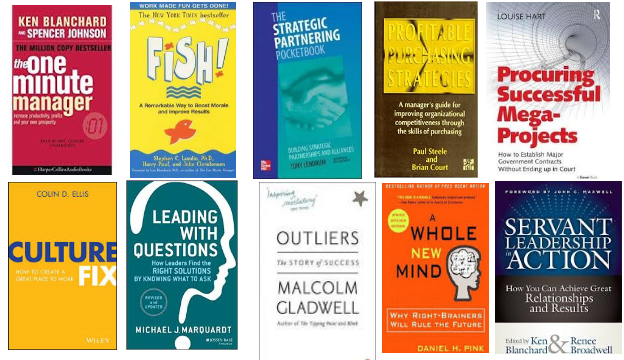
Since the age of 18 I have been working and developing my leadership knowledge through practical experiences, professional courses, qualifications, books and the practical experience that comes from being part of a work based team. At the age of 24 I was given my first leadership role at British Telecom leading a team of over 20 people. Christmas 2020 has seen me reflect on my leadership journey and knowledge gained and implemented in many of my past teams and organisations. There are so many writers missing including Richard Branson, Sir Alex Ferguson, Jeffery Hiatt, Gwendoline Smith, Don Steinberg but I’ve selected the texts I often refer to with the most thumbed pages.
After an extraordinary year that I never thought I would experience and the impact of COVID19 I have summarised my key “takeaways” from each book. I know that when you get the chance to read some of these publications you’ll find many others. Let us kick off with the first book and enjoy.
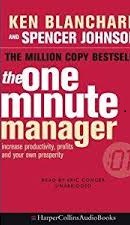
Ken Blanchard & Spencer Johnson – the One minute manager
This book was designed for busy Managers and suggests that you spend 60 seconds per day; or at least per week (my thoughts) on each of the following;
a) Discussing and setting clear goals
b) Giving praise as feedback
c) Creating clarity and feedback when things require development (reprimands)
Basically this is about communication with your team, regularly checking in and making sure they understand the goals set, building them up and praising their achievements (including behaviour) and making sure you give them the feedback when the have done something wrong or delivered incorrectly. This may sound simple. Think about the Managers you have had that have done all 3 and the ones that have not its a great leveler.

Stephen C. Lundin , Harry Paul & John Christensen – FISH
This is one of my favourite culture books. I have used the Fish philosophy when building culture in many of my past teams. Some teams were established and performing but not well and some were in a bad way. The basic philosophy was bought about through a new leader interacting with staff at the Fish Market in Seattle. She was given a role to change a department know as the “Toxic waste dump” The 4 platform philosophies are;
- Chose your attitude every day
- Make someone’s day every day
- Be Present
- Have Fun
They may sound simple but requires a lot of guidance and continual practice. Is your team culture unpleasant? Is it know as the toxic waste dump in your organisation? Take a look, this will definitely make a difference to team culture !
I know how this set of philosophies can make that difference no matter the industry and organisation.

Tony Lendrum – The Strategic Partnering Pocketbook
I have been very lucky to have met and worked with Tony on numerous occasions. This book and methodology is based around the Supplier and Customer Dyad and the dynamics to get Win / Win outcomes and growth from your strategic partnerships.
The first key principle is to understand and map all your relationships. Not all relationships need to be strategic and there are very successful relationships that are tactical so you need to work out which ones you want to spend time on and implement a relationship program.
Once the relationships are mapped there are tools to understand where both organisation’s have the propensity to partner. Workshops are completed to agree the partnership programme with key actions and governance models enabling the delivery of shared value and growth.
I have used this methodology many times both as a supplier leading it with our key customers and as a customer leading our suppliers. There is a lot of talk about Supplier Relationship Management and Customer Relationship Management however my greatest success has come from using this methodology in all my strategic relationships.
The key take out is first understand the type of relationship you have and then discover where there is a propensity to partner to enable growth and create a win/win. If not aligned then maybe you should change! The fundamental outcome is that you have to be aligned and want the same thing out of the relationship / partnership.

P. Steele & Brian H. Court – Profitable Purchasing Strategies
This was a foundational book when I entered into my first Procurement and Supply Chain role over 15 years ago . It details the basics and tools that can be used to deliver end to end strategic procurement within an organisation. The case is made for purchasing to be viewed as an essential business process. Again, this book has a significant focus on the relationship dyad.
The 2 key tools and insights I gained were the Supplier Positioning Model- a modification on the Kraljic Matrix and the Supplier Preferencing Model providing insights on segmentation and management actions required to deliver the best value outcomes.
These 2 tools within a very detailed procurement book and guide are what I would call staples for any procurement practitioner. If you are not using a variation of these 2 by 2 matrices then you will not understand the value and behaviour / potential behaviour of your supplier base.
A highly recommended read for any procurement or supply chain practitioner.
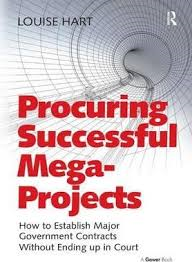
Louise Hart – Procuring Successful Mega Projects
I was fortunate to work with Louise at Transpower ( the National Grid) in New Zealand. Louise has previously been involved in many mega Transport projects in both U.K and Sydney, all in the public sector and in the advent of Public Private Partnerships.
This book encapsulates the 30 years experience that Louise has gained across the Public and Private Sectors in large projects across different jurisdictions. Her legal beginnings has given her a great platform in understanding the basic needs of contracting practices and the need for clear objectives. I would like to thank her for mentioning me in her preface as we often discussed our common understanding of the end to end processes, experiences and issues that have arisen from procurement and contracting of projects.
The takeaways are succinctly put in chapter 19 A final Word;
- Be clear in the objectives
- Leave your brain switched on
- Find the best people
- Identify all of the scope
- Allocate risk to people who know what to do with it
- Design the right procurement process
- Consult. Properly
- Insist on good governance
- Distinguish between price and value for money
- Acknowledge your own fallibility

Colin Ellis – Culture Fix
Colin Ellis and Culture Fix are another author and book which has positively shaped my leadership career . Colin and I were fortunate to work together in the ICT department at Transpower in New Zealand ( The National Grid). Colin was Head of the Enterprise Project Office and we were both part if the ICT leadership team. His book was only published in 2020 and contains a real pragmatic view of what is culture and why culture is critical when building high performing organisations / teams. Colin’s leadership journey commenced about 20 years ago and he has used his experience and collated some great input from successful organisations across the world. The 2 big takeaways for me are;
Values and Behaviour
- Values are an intrinsic part of culture creation when delivered with the Vision and Mission you set as a leader
- Values must be lived and will require courage
- Values should be specific to the organisation (not bland and generic)
- Values should be used in the hiring process
- Behaviour change is crucial for any kind of transformation
- Knowledge of behaviour change is one thing, action and accountability quite another
- Keeping secrets is bad for culture, even if no one knows
Frequently when you see things written down you know that they make common sense and think yep I get that. This is the beauty of great books and why so much time is spent to research and compile. Colin’s book is one of these books with many real examples, case study and quotes from CEOS and leaders of successful organisations. The book also has it reference’s tabulated against the sections of the book to easily find if you want to expand you knowledge in a specific area of culture.
Fiona and I also have a favourite quote from the book from the CEO of Airbnb Brian Chesky
” Culture is a thousand things a thousand times”
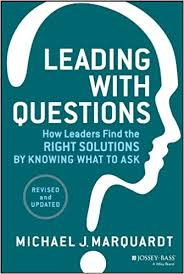
Michael Marquardt – Leading with Questions
Growing up and being a parent I am sure many of you would have had the experience with children that keep asking questions even after you have given them an answer. Constantly asking questions can often appear to be seen as frustrating for staff and colleagues. This book has a practical set of initiatives that can be used in leading organisations and staff . It starts by looking at the power of questions and how they can be used as management tools and culture builders. It gives a guide of how and when to ask questions when managing people, teams , solving problems and even developing strategy. My takeaway from this book is the power of questions to enable and build relationships. Here are some of the questions that empower relationships when managing people;
- What can we learn from this?
- Do you understand what I’m asking you to do?
- How can I help you?
- What’s next?
- Where should we be placing our best energy?
- What are we missing or forgetting?
- How can we do it better next time?
- What do you think?
- What changes could we make to make your work-life better?
- What would you do differently if you has my position?
- Are you enjoying your work?
- How can I improve my communication with you?

Malcolm Gladwell Outliers – The story of Success
Outliers explains why “the self-made man” is a myth and what truly lies behind the success of the best people in their field, which is often a series of lucky events, rare opportunities and other external factors, which are out of our control. However if you look at this summary you may think why has this part of my Top 10 leadership books. Within the detail there is clear evidence that to achieve mastery of anything it takes 10,000 hours of practice. This is basically 5 years.
Therefore the old adage ‘the harder I work the luckier I get’ is attributed to the number of hours I have practiced in that field and eventually reaching mastery. I’ve mapped my Rugby Union career from the date I got my break to play at elite level with Harlequins in London and the number of actual games I had played and practiced the skills. Prior to my breakthrough I was playing 3 games a week at school, club and county level and practicing 3 times a week for between 1-2 hours through this I had achieved mastery enabling me to be picked up at an elite level club. ( The harder I worked the luckier I got )
The basic premise is the more you do something the greater your experiences are and your ablity to second guess the next steps correctly almost become second nature.
My learning after 33 years of being a people leader is that experience allows you to deal with all eventualities when leading teams and people. This enables confidence and confidence along with trust are important charismatic characteristics in your leadership career!
An inspiring must read that might change your thought processes about success.
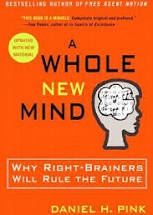
Daniel Pink – A whole New Mind
The tag line on the front cover is provocative and as a leader should entice you into reading this “Why Right – Brainers will rule the future”. If that is not enough to make you open the book read the back page tag line – “If its likely soon in China or India can do your work more cheaply than you can , or if a computer can do your job faster than you can , read this book”. The book was first published in 2005 so can also add Artificial Intelligence (AI) to this quote.
The book looks through history and explains why leaders in the past have been Left Brain Thinkers, MBAs were the most sought after qualification for CEOs and now computers can do all that left brain sequential and numbers stuff. Our growth in humanity has been to high concept and high touch, introducing abundance and automation and what that means for future leadership.
My insight is that Right Brain leadership will enable all our future organisations. The Masters of Fine Art will become the new MBA. People want stories, the reason why, concepts and ideas. Just look at how advertising has gone from formats that emphasise price reduction, save x, we are the cheapest etc to telling stories and beautiful images. One that has hit me recently is the beer advert by Heineken. Obviously there are issues with beer sales world wide and the move to more specialist brews, ready mixes and wine consumption growth. A new advert shows bar staff delivering a cocktail to a woman and the Heineken to the man in various situations. The powerful message in the story is when they swap glasses. The advert ends with the text “Women like Heineken too”
This is a clear example of what Daniel Pink has presented in his book.
Pink introduces the Six senses below;
- Not just function but also DESIGN
- Not just argument but also STORY
- Not just focus but also SYMPHONY
- Not just logic but also EMPATHY
- Not just seriousness but also PLAY
- Not just accumulation but also MEANING

Ken Blanchard & Renee Broadwell – Servant Leadership in Action
Well I have left what I think is one of the best leadership books to last.
Ken Blanchard opened up the leadership vision by introducing servant leadership in 2011 even though his books of the 90s he had hinted at the need to support your team. Blanchard believes that servant leaders are constantly trying to find out what their people need to perform well and to live according to their organisation’s vision. Rather than wanting people to please their bosses, servant leaders want to make a difference in their employees’ lives and in their organisations.
He basically tips the Autocratic Leadership Pyramid on it head with the team being at the top and the most important as they are closer to the customer in delivery of the organisation’s vision. The leader sits at the bottom of the pyramid supporting the team.

This has always been completely aligned to my leadership vision from the age of 24 and also as a captain of many Rugby Union sports teams. A leader or captain is a reflection of the team and the team performance. It does not matter how good you are as an individual if your team is not performing then you are not performing. The teams success is your success.
Here are 10 of the characteristics that make a great servant leader ;
- Listening
- Empathy
- Healing
- Awareness
- Persuasion
- Conceptualization
- Foresight.
- Stewardship
- Commitment to the growth of people
- Building community
Many leaders feel threatened by Servant Leadership and use hierarchy and role status to control. I have seen this many time throughout my career, and this is a reflection of the leader not being confident about their own position and capabilities. There is also this inherent fear that team members will take their own role which should be seen as a success rather than a failure. To me this is a very shortsighted leadership approach and eventually is flawed.
Being a servant leader is very time consuming especially in large teams. It takes time to understand each team member and requires input through one to one coaching. You are there to enable each member to achieve goals creating a high performing team and delivering organisational success. It is not for faint hearted and like culture with a play on the quote by the CEO of Airbnb Brian Chesky;
leadership is a thousand things a thousand times – supporting and enabling your team to win (achieving personal and organisational goals).